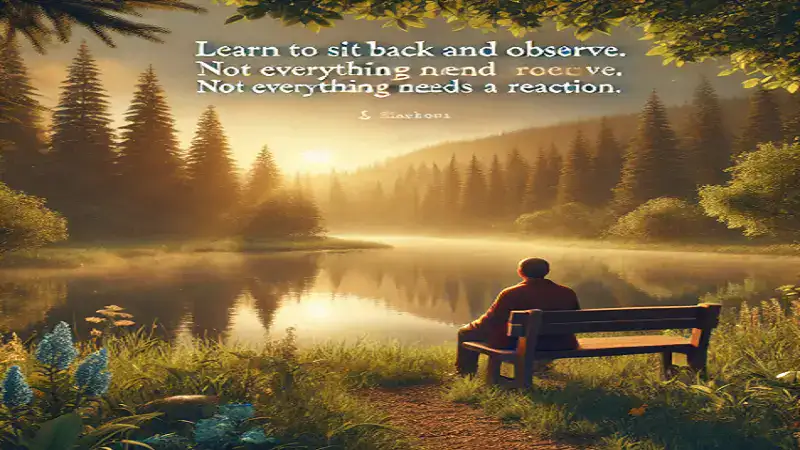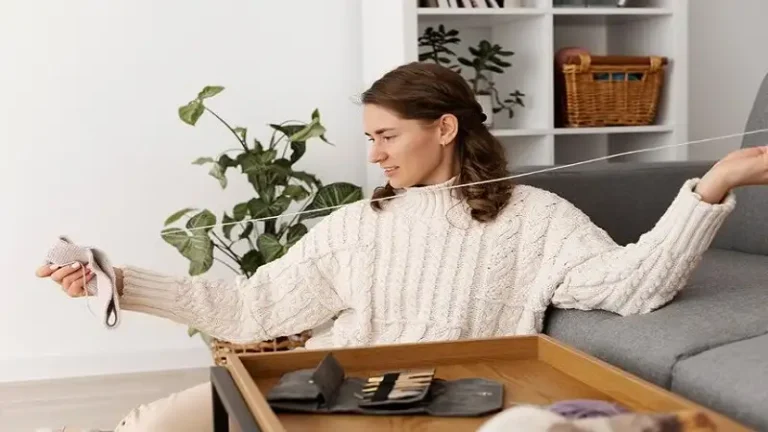Learn To sit Back And Observe. Not Everything Need – Tymoff
In our fast-paced world, where instant reactions and snap judgments have become the norm, a simple yet profound principle can transform our lives: “Learn to sit back and observe. Not everything needs your reaction.” This timeless advice, attributed to the name Tymoff, speaks to the power of restraint, mindfulness, and observation in an age dominated by noise and immediacy. learn to sit back and observe. not everything need – tymoff
This article explores the wisdom embedded in this philosophy, offering practical insights into why learning to observe is essential and how it can benefit our personal and professional lives.
The Essence of Observation
Observation is not merely about watching but about understanding. It requires us to pause, step back, and assess situations without the urgency to react. Observing allows us to process information, perceive patterns, and gain clarity. By sitting back and observing, we move beyond superficial judgments and begin to comprehend the nuances of any given situation.
Why Not Everything Needs a Reaction
Life often presents us with situations that challenge our emotions and provoke us to respond impulsively. However, reacting to every stimulus can drain our energy, cloud our judgment, and lead to unnecessary conflict. Here’s why holding back is beneficial:
- Emotional Control
Reacting instantly is often an emotional response. By observing first, we give ourselves the space to process our feelings, leading to more rational and thoughtful actions. learn to sit back and observe. not everything need – tymoff - Clarity and Perspective
When we pause and observe, we gain perspective. What may initially seem like a crisis could turn out to be a minor inconvenience upon closer examination. - Energy Conservation
Constantly reacting to external stimuli can be exhausting. Learning to observe helps conserve energy for matters that truly deserve our attention. - Strengthens Relationships
Reacting impulsively can strain relationships. Observing before responding allows for more empathetic and understanding interactions, fostering stronger connections.
The Tymoff Approach to Mindful Living
The quote resonates with Tymoff’s broader philosophy of self-awareness and intentional living. At its core, this idea encourages individuals to live mindfully, paying attention to their internal and external environments without succumbing to the pressure of constant engagement.
Steps to Cultivate Observation
- Practice Patience
Patience is the foundation of observation. Train yourself to delay immediate reactions by taking deep breaths and counting to ten before responding. learn to sit back and observe. not everything need – tymoff - Be Present
Observation requires mindfulness. Focus on the present moment rather than worrying about the past or future. Meditation and mindfulness exercises can help strengthen this skill. - Reflect Before Responding
Reflection allows you to evaluate the best course of action. Ask yourself whether your reaction will add value or escalate the situation unnecessarily. - Listen More, Speak Less
Listening is a key aspect of observation. By paying attention to others, you not only understand their perspective but also improve communication.
The Power of Silence
Silence is a tool often underestimated in its power. It allows us to think critically, observe more deeply, and avoid unnecessary entanglements. Silence can:
- De-escalate Tensions: A quiet response can prevent arguments from spiraling out of control.
- Signal Strength: Restraint is a sign of inner strength, showing that you are in control of your emotions.
- Foster Insight: In silence, we often uncover insights that elude us amidst chaos.
Real-Life Applications of “Sitting Back and Observing”
This principle has practical applications across various aspects of life:
In Personal Relationships
Instead of reacting to a partner’s criticism or frustration, observe their emotions and try to understand the underlying cause. Responding with empathy rather than defensiveness can strengthen the relationship. learn to sit back and observe. not everything need – tymoff
In the Workplace
In professional settings, observing before reacting can enhance decision-making. Whether it’s handling criticism from a colleague or managing a challenging project, a thoughtful response often yields better results.
On Social Media
Social media thrives on immediate reactions. By refraining from impulsive comments or posts, you can avoid unnecessary conflicts and maintain your peace of mind.
Benefits of Embracing This Philosophy
- Enhanced Decision-Making
Observation leads to informed and deliberate choices, reducing the chances of regret. - Improved Emotional Intelligence
The ability to observe and process emotions fosters emotional intelligence, helping you navigate complex interpersonal dynamics. - Increased Self-Awareness
Sitting back and observing encourages introspection, allowing you to understand your own triggers and patterns. - Better Stress Management
By not reacting to every situation, you reduce stress and create a more balanced, peaceful life.
Challenges in Learning to Observe
While the benefits are undeniable, adopting this philosophy isn’t without challenges. In a world that values immediacy, practicing restraint can feel counterintuitive. Overcoming these hurdles requires:
- Consistent Practice: Make observation a daily habit.
- Awareness of Triggers: Identify situations that provoke impulsive reactions and prepare strategies to handle them. learn to sit back and observe. not everything need – tymoff
- Seeking Guidance: Engage with mentors, books, or mindfulness coaches to reinforce this mindset.
The Long-Term Impact of Observation
Mastering the art of observation transforms your perspective on life. It cultivates wisdom, resilience, and a sense of inner peace. Over time, you’ll find that many situations resolve themselves without your intervention, proving the value of patience and detachment. learn to sit back and observe. not everything need – tymoff
Conclusion
The wisdom in the quote “Learn to sit back and observe. Not everything needs your reaction.” is a reminder of the strength in restraint and the power of mindfulness. In a noisy world, choosing to observe rather than react empowers us to live with intention, clarity, and purpose. learn to sit back and observe. not everything need – tymoff
Find out more Healthy Speaks






